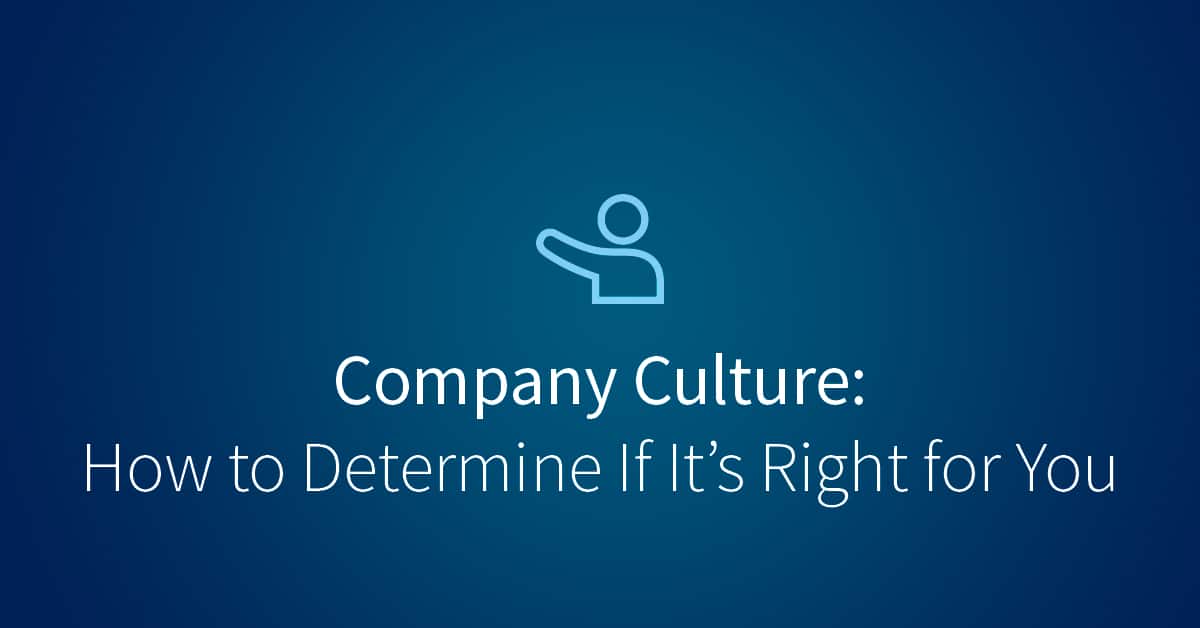Getting a job offer is fantastic (congrats!), but before you commit, you’ll want to make sure the cultural fit is completely mutual. The greatest predictor of the longevity of your experience with any company likely won’t be your salary, benefits, or title — it’ll be the cultural accord. Any role you step into, however awesome it is on paper, should be as perfect for you as you are for the company.
Not sure exactly how to measure that cultural coherence, beyond a gut feeling? First of all, familiarize yourself with the aspects of a company that affect its professional culture. Metrics that affect culture might include the size and age of the organization, the personalities of the people in charge, the organization’s mission and product, and the average age and diversity of the employees. A tech startup is more likely to have a youthful, energized culture compared to a legacy tech company, but could also be more unorganized and demanding of its staff. A creative agency probably has a more casual, charismatic vibe than an SAAS (software as a service) company, but could have much longer work hours and less opportunity for organized professional advancement.
With that background under your belt, know that, stereotypes aside, every single company has a unique culture and it’s up to you to sniff it out before signing on. Here’s how to gauge whether or not you’ll be happy in your new professional home.
Find Out Why the Gig’s Available
The first step is to make sure you’re in the know about why exactly the job is available. Get the lowdown from the recruiter or hiring manager, or keep your ears perked for clues from the other employees who interview you. If the role was vacated by someone promoted (either internally or externally) or someone who had been at the organization for many years and sought a change, or if it’s a brand new opening at the company, there are probably no red flags you need to pursue. If you do sense, for a preexisting role, that there was tension surrounding the person’s departure, pay attention to your instincts as to whether or not there are substantive issues at play — a slave-driving boss, an unrealistically heavy workload — that might cause unrest for you, too.
Ask the Right Questions in the Right Way
During the interview process, there’s a certain finesse required in poking around for answers on what a company’s culture is like. For example, if you want to know whether employees typically take an actual lunch hour or else grab food and scarf it down at their desks while working, it may be better to ask an interviewer who would be on your peer level than one who would be your future manager. You want to get information without implying to a higher-up an unwillingness to devote yourself to the job.
Do you feel (…) that this is a healthy, supportive, fulfilling place for you to spend 40+ hours of your week?
But you can feel free to ask anyone openly about what people like most about their coworkers, or about what the team does, if anything, to bond and keep morale high. Also be sure to get the complete lowdown from the HR department or the recruiter on the organization’s benefits policy. How generous a company is in its extension of benefits like 401(k) matching or pre-tax transit is often an indicator of how cared-for employees feel in general.
Look For Clues in the Office
Use every second of your time at the company’s office to collect data on what it’s like to work there. Does the receptionist seem upbeat or at least content, or does he or she look dejected and miserable? How do the employees talk to each other and interact with each other, if at all? What’s the noise volume? What are people wearing?
Hunt Online
Scour professional sites like Glassdoor and LinkedIn, plus social networks like Twitter and Quora, to gather intel on what it’s like to work at the company you’re considering joining. Glassdoor offers detailed reviews from former and current employees of more than 350,000 companies, covering everything from average salaries to CEO approval ratings. On LinkedIn, take a look at how current employees of the company describe their roles, and what people’s recent recommendations of them say, in case the content helps you draw conclusions about the company culture (for example, you could find a reference to working late nights or a fun recurring company happy hour). On social media and online forums, search for the name of the company and names of key executives like the CEO and whoever your manager will be. You may even find that some of the exact questions you’ve got have already been asked, especially if it’s a well-known company, and you can then take advantage of browsing the answers. Of course, take note of the posting date of any of the information you glean from your online searching. If any content is more than a few years old, read it with a grain of salt.
Ask Around Offline
When it comes to gathering insights into a company, your personal network is just as valuable as your online network. If you were referred to the group by an acquaintance, start there. If not, you never know who you might know (or who they might know) with valuable information about the company. Just be prudent in how you ask, taking a positive and optimistic approach rather than a skeptical or cynical one. You don’t want it to get back to the hiring manager that you were snooping around for dirt.
Do the 4-Point Check: Head, Heart, Gut, Wallet
Finally, do what’s called the four-point check: check in with yourself to see how you feel about accepting the job offer from a logical standpoint, an emotional perspective, intuitively, and with respect to your finances. Does this role make sense for you as your next career step, and do all your findings add up to what seems like a pretty rosy cultural picture? Do you feel in your heart that this is a healthy, supportive, fulfilling place for you to spend 40+ hours of your week? (And no, it’s not unrealistic to expect that of your work environment.) Does this seem like the right move to you on a base level, in your gut? And, lastly (yes, last), does the offer make sense for your bank account?
The Bottom Line
Overall, remember your worth. The company in question is excited for you to contribute your unique talent and skills, in exchange for which you should expect a constructive, encouraging professional habitat. Be willing to invest the time and energy up front to ensure that your values match up with those of the company extending you the job offer. It’s a lot easier to do the work of guaranteeing, as much as you can, that you’ll be happy in this position before you sign the offer letter than it is to go on board only to realize a month or so in that you’re the black sheep of the bunch. Good luck!




